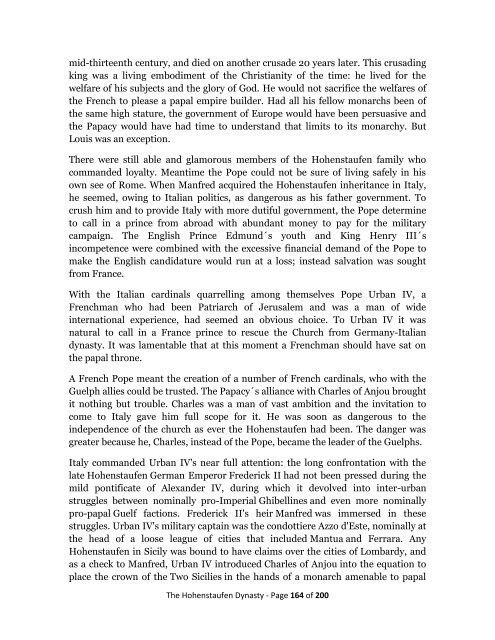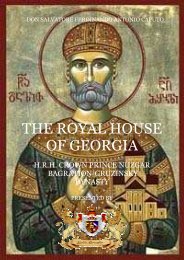here - Nobility Associations
here - Nobility Associations
here - Nobility Associations
Create successful ePaper yourself
Turn your PDF publications into a flip-book with our unique Google optimized e-Paper software.
mid-thirteenth century, and died on another crusade 20 years later. This crusading<br />
king was a living embodiment of the Christianity of the time: he lived for the<br />
welfare of his subjects and the glory of God. He would not sacrifice the welfares of<br />
the French to please a papal empire builder. Had all his fellow monarchs been of<br />
the same high stature, the government of Europe would have been persuasive and<br />
the Papacy would have had time to understand that limits to its monarchy. But<br />
Louis was an exception.<br />
T<strong>here</strong> were still able and glamorous members of the Hohenstaufen family who<br />
commanded loyalty. Meantime the Pope could not be sure of living safely in his<br />
own see of Rome. When Manfred acquired the Hohenstaufen inheritance in Italy,<br />
he seemed, owing to Italian politics, as dangerous as his father government. To<br />
crush him and to provide Italy with more dutiful government, the Pope determine<br />
to call in a prince from abroad with abundant money to pay for the military<br />
campaign. The English Prince Edmund´s youth and King Henry III´s<br />
incompetence were combined with the excessive financial demand of the Pope to<br />
make the English candidature would run at a loss; instead salvation was sought<br />
from France.<br />
With the Italian cardinals quarrelling among themselves Pope Urban IV, a<br />
Frenchman who had been Patriarch of Jerusalem and was a man of wide<br />
international experience, had seemed an obvious choice. To Urban IV it was<br />
natural to call in a France prince to rescue the Church from Germany-Italian<br />
dynasty. It was lamentable that at this moment a Frenchman should have sat on<br />
the papal throne.<br />
A French Pope meant the creation of a number of French cardinals, who with the<br />
Guelph allies could be trusted. The Papacy´s alliance with Charles of Anjou brought<br />
it nothing but trouble. Charles was a man of vast ambition and the invitation to<br />
come to Italy gave him full scope for it. He was soon as dangerous to the<br />
independence of the church as ever the Hohenstaufen had been. The danger was<br />
greater because he, Charles, instead of the Pope, became the leader of the Guelphs.<br />
Italy commanded Urban IV's near full attention: the long confrontation with the<br />
late Hohenstaufen German Emperor Frederick II had not been pressed during the<br />
mild pontificate of Alexander IV, during which it devolved into inter-urban<br />
struggles between nominally pro-Imperial Ghibellines and even more nominally<br />
pro-papal Guelf factions. Frederick II's heir Manfred was immersed in these<br />
struggles. Urban IV's military captain was the condottiere Azzo d'Este, nominally at<br />
the head of a loose league of cities that included Mantua and Ferrara. Any<br />
Hohenstaufen in Sicily was bound to have claims over the cities of Lombardy, and<br />
as a check to Manfred, Urban IV introduced Charles of Anjou into the equation to<br />
place the crown of the Two Sicilies in the hands of a monarch amenable to papal<br />
The Hohenstaufen Dynasty - Page 164 of 200



